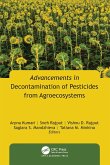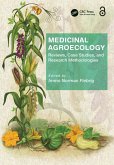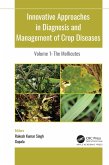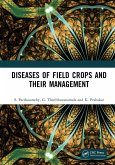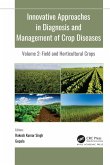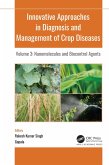Advancements in Decontamination of Pesticides from Agroecosystems (eBook, ePUB)
Redaktion: Kumari, Arpna; Minkina, Tatiana M.; Mandzhieva, Saglara S.; Rajput, Vishnu D.; Rajput, Sneh
167,95 €
167,95 €
inkl. MwSt.
Sofort per Download lieferbar

84 °P sammeln
167,95 €
Als Download kaufen

167,95 €
inkl. MwSt.
Sofort per Download lieferbar

84 °P sammeln
Jetzt verschenken
Alle Infos zum eBook verschenken
167,95 €
inkl. MwSt.
Sofort per Download lieferbar
Alle Infos zum eBook verschenken

84 °P sammeln
Advancements in Decontamination of Pesticides from Agroecosystems (eBook, ePUB)
Redaktion: Kumari, Arpna; Minkina, Tatiana M.; Mandzhieva, Saglara S.; Rajput, Vishnu D.; Rajput, Sneh
- Format: ePub
- Merkliste
- Auf die Merkliste
- Bewerten Bewerten
- Teilen
- Produkt teilen
- Produkterinnerung
- Produkterinnerung

Bitte loggen Sie sich zunächst in Ihr Kundenkonto ein oder registrieren Sie sich bei
bücher.de, um das eBook-Abo tolino select nutzen zu können.
Hier können Sie sich einloggen
Hier können Sie sich einloggen
Sie sind bereits eingeloggt. Klicken Sie auf 2. tolino select Abo, um fortzufahren.

Bitte loggen Sie sich zunächst in Ihr Kundenkonto ein oder registrieren Sie sich bei bücher.de, um das eBook-Abo tolino select nutzen zu können.
This new book addresses the need to limit and control the use of pesticides for crops by investigating and implementing remediation procedures. It focuses on contemporary remediation techniques used to properly and sustainably remove these pollutants. The various remediation methods discussed include the utilization of macrophytes, microorganisms, microbial enzymes, cyanobacteria, and nanotechnology.
- Geräte: eReader
- mit Kopierschutz
- eBook Hilfe
- Größe: 10.21MB
Andere Kunden interessierten sich auch für
![Advancements in Decontamination of Pesticides from Agroecosystems (eBook, PDF) Advancements in Decontamination of Pesticides from Agroecosystems (eBook, PDF)]() Advancements in Decontamination of Pesticides from Agroecosystems (eBook, PDF)167,95 €
Advancements in Decontamination of Pesticides from Agroecosystems (eBook, PDF)167,95 €![Medicinal Agroecology (eBook, ePUB) Medicinal Agroecology (eBook, ePUB)]() Medicinal Agroecology (eBook, ePUB)81,95 €
Medicinal Agroecology (eBook, ePUB)81,95 €![Innovative Approaches in Diagnosis and Management of Crop Diseases (eBook, ePUB) Innovative Approaches in Diagnosis and Management of Crop Diseases (eBook, ePUB)]() Innovative Approaches in Diagnosis and Management of Crop Diseases (eBook, ePUB)129,95 €
Innovative Approaches in Diagnosis and Management of Crop Diseases (eBook, ePUB)129,95 €![Diseases of Field Crops and their Management (eBook, ePUB) Diseases of Field Crops and their Management (eBook, ePUB)]() S. ParthasarathyDiseases of Field Crops and their Management (eBook, ePUB)186,95 €
S. ParthasarathyDiseases of Field Crops and their Management (eBook, ePUB)186,95 €![Integrated Crop Protection (eBook, ePUB) Integrated Crop Protection (eBook, ePUB)]() P. GraffinIntegrated Crop Protection (eBook, ePUB)363,95 €
P. GraffinIntegrated Crop Protection (eBook, ePUB)363,95 €![Innovative Approaches in Diagnosis and Management of Crop Diseases (eBook, ePUB) Innovative Approaches in Diagnosis and Management of Crop Diseases (eBook, ePUB)]() Innovative Approaches in Diagnosis and Management of Crop Diseases (eBook, ePUB)129,95 €
Innovative Approaches in Diagnosis and Management of Crop Diseases (eBook, ePUB)129,95 €![Innovative Approaches in Diagnosis and Management of Crop Diseases (eBook, ePUB) Innovative Approaches in Diagnosis and Management of Crop Diseases (eBook, ePUB)]() Innovative Approaches in Diagnosis and Management of Crop Diseases (eBook, ePUB)129,95 €
Innovative Approaches in Diagnosis and Management of Crop Diseases (eBook, ePUB)129,95 €-
-
-
This new book addresses the need to limit and control the use of pesticides for crops by investigating and implementing remediation procedures. It focuses on contemporary remediation techniques used to properly and sustainably remove these pollutants. The various remediation methods discussed include the utilization of macrophytes, microorganisms, microbial enzymes, cyanobacteria, and nanotechnology.
Dieser Download kann aus rechtlichen Gründen nur mit Rechnungsadresse in A, B, BG, CY, CZ, D, DK, EW, E, FIN, F, GR, HR, H, IRL, I, LT, L, LR, M, NL, PL, P, R, S, SLO, SK ausgeliefert werden.
Produktdetails
- Produktdetails
- Verlag: Taylor & Francis eBooks
- Seitenzahl: 290
- Erscheinungstermin: 14. Oktober 2025
- Englisch
- ISBN-13: 9781040229569
- Artikelnr.: 74871202
- Verlag: Taylor & Francis eBooks
- Seitenzahl: 290
- Erscheinungstermin: 14. Oktober 2025
- Englisch
- ISBN-13: 9781040229569
- Artikelnr.: 74871202
- Herstellerkennzeichnung Die Herstellerinformationen sind derzeit nicht verfügbar.
Arpna Kumari, PhD, was previously a Senior Researcher at the Academy of Biology and Biotechnology, Southern Federal University. She is now working at the University of Tokyo, Japan. She has eight years of research experience in the field of plant physiology with special emphasis on abiotic stressors, stress mitigation strategies, applications of nanotechnology in sustainable agriculture and contaminated soil restoration, and cytotoxicity and genotoxicity of emerging pollutants. She has published scientific papers, book chapters, and conference papers and has reviewed many manuscripts for national and internationally reputed journals. Sneh Rajput, PhD, is a Researcher in the Department of Botanical and Environmental Sciences at Guru Nanak Dev University, India. She has worked on antimutagenic properties of allyl and butyl isothiocyanates using Vibrio harveyi bioluminescence assay. She has published research and review papers in international and national journals as well as book chapters. She has presented her work at national and international conferences and has published abstracts as well. Vishnu D. Rajput, PhD, is a leading researcher (Associate Professor) and Head of the Soil Health Lab at Southern Federal University, Rostov-on-Don. Dr. Rajput has detailed the state of research in environmental science with regard to how nanoparticles/heavy metals interact with plants, soils, microbial community, and the larger environment as well as possible remediation technology using nanoparticles/nano-biochar. He has published many scientific articles, book chapters, and conference papers and is a recognized reviewer for several well-known publishers and journals. Saglara S. Mandzhieva, PhD, is Head of the Laboratory Monitoring of Biosphere at Southern Federal University. She is working on biogeochemistry of trace elements in soil, environmental soil chemistry, and remediation using physicochemical treatment methods. She has published many scientific publications and is handling several research projects. Dr. Mandzhieva is an editorial board member of several journals. Tatiana Minkina, PhD, is the Head of the Soil Science and Land Evaluation Department of Southern Federal University. She is Head of the International Master's Degree Educational Program "Management and Estimation of Land Resources" (accredited by ACQUIN). Her areas of scientific interest are soil science, biogeochemistry of trace elements, and environmental soil chemistry. She also works in the areas of soil monitoring, assessment, modeling, and remediation using physicochemical treatment methods. Currently, she is handling several funded projects. She has over 750 scientific publications to her credit.
1. Introduction to Pesticides: Impact, Toxicity, and Challenges 2.
Determination of Pesticides: Dissemination, Extraction, and Detection
Techniques 3. Usage of Macrophytes to Reduce the Pesticide Contamination
Level in Water 4. Bioremediation of Pesticides and Heavy-Metal-Polluted
Soils 5. Microorganisms: An Alternative Strategy to Combat
Pesticide-Polluted Soil 6. Ameliorative Processes in Plants as a Natural
Tool for Elimination of Pesticides Using Plants 7. Microbial
Enzyme-Mediated Degradation of Pesticides: A Propitious Pesticide Removal
Method 8. Cyanoremediation: A Clean Green Technology for Eradication of
Pesticides from Agro- and Aquatic Ecosystems 9. Nanoremediation of
Pesticides: An Emerging Approach for a Cleaner Environment
Determination of Pesticides: Dissemination, Extraction, and Detection
Techniques 3. Usage of Macrophytes to Reduce the Pesticide Contamination
Level in Water 4. Bioremediation of Pesticides and Heavy-Metal-Polluted
Soils 5. Microorganisms: An Alternative Strategy to Combat
Pesticide-Polluted Soil 6. Ameliorative Processes in Plants as a Natural
Tool for Elimination of Pesticides Using Plants 7. Microbial
Enzyme-Mediated Degradation of Pesticides: A Propitious Pesticide Removal
Method 8. Cyanoremediation: A Clean Green Technology for Eradication of
Pesticides from Agro- and Aquatic Ecosystems 9. Nanoremediation of
Pesticides: An Emerging Approach for a Cleaner Environment
1. Introduction to Pesticides: Impact, Toxicity, and Challenges 2.
Determination of Pesticides: Dissemination, Extraction, and Detection
Techniques 3. Usage of Macrophytes to Reduce the Pesticide Contamination
Level in Water 4. Bioremediation of Pesticides and Heavy-Metal-Polluted
Soils 5. Microorganisms: An Alternative Strategy to Combat
Pesticide-Polluted Soil 6. Ameliorative Processes in Plants as a Natural
Tool for Elimination of Pesticides Using Plants 7. Microbial
Enzyme-Mediated Degradation of Pesticides: A Propitious Pesticide Removal
Method 8. Cyanoremediation: A Clean Green Technology for Eradication of
Pesticides from Agro- and Aquatic Ecosystems 9. Nanoremediation of
Pesticides: An Emerging Approach for a Cleaner Environment
Determination of Pesticides: Dissemination, Extraction, and Detection
Techniques 3. Usage of Macrophytes to Reduce the Pesticide Contamination
Level in Water 4. Bioremediation of Pesticides and Heavy-Metal-Polluted
Soils 5. Microorganisms: An Alternative Strategy to Combat
Pesticide-Polluted Soil 6. Ameliorative Processes in Plants as a Natural
Tool for Elimination of Pesticides Using Plants 7. Microbial
Enzyme-Mediated Degradation of Pesticides: A Propitious Pesticide Removal
Method 8. Cyanoremediation: A Clean Green Technology for Eradication of
Pesticides from Agro- and Aquatic Ecosystems 9. Nanoremediation of
Pesticides: An Emerging Approach for a Cleaner Environment

